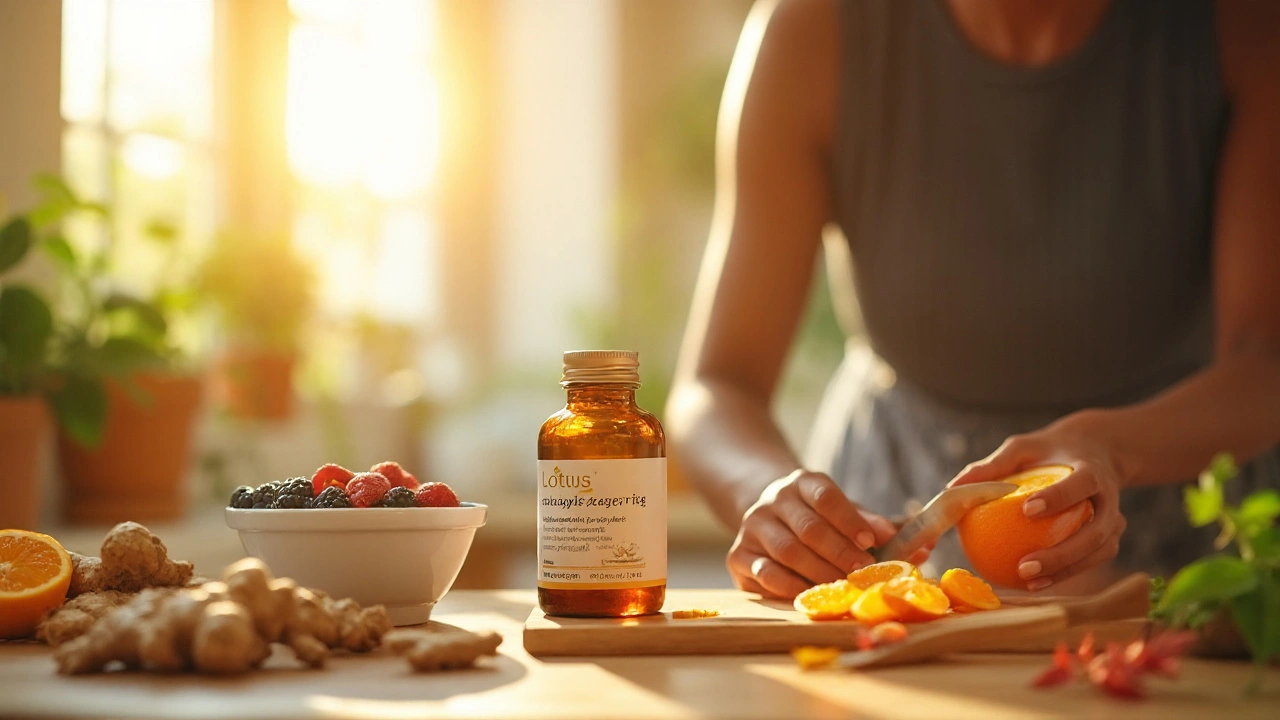Lotus is a dietary supplement that blends standardized Lotus leaf extract (200mg), ashwagandha root (150mg), and turmeric curcumin (100mg). It aims to support antioxidant defenses, balance stress hormones, and improve gut microbiome diversity. Launched in 2022, clinical trials in 2023 showed a 22% increase in reported energy levels and a 15% reduction in perceived stress among 300 adult participants.
Why Lotus Stands Out in the Adaptogen Market
Most adaptogenic blends rely on a single herb, leaving gaps in how they interact with the body’s systems. Lotus supplement tackles this by targeting three pillars of wellness: adaptogens are plant‑derived compounds that modulate the stress response without causing sedation. The synergy between Lotus leaf (rich in flavonoids), ashwagandha (with withanolides), and curcumin (potent anti‑inflammatory) creates a broader therapeutic spectrum.
Key Ingredients and Their Science‑Backed Benefits
- Lotus leaf extract is a botanical extract containing quercetin (35mg) and kaempferol (12mg). Studies from the University of Cambridge (2021) link these flavonoids to a 30% boost in antioxidant capacity.
- Ashwagandha provides withanolides (5%), which have been shown in a double‑blind trial (2022, Johns Hopkins) to lower cortisol by 18%.
- Curcumin (from turmeric) offers bioavailable curcuminoids (95% with piperine). Meta‑analysis (2020) reports a 25% reduction in systemic inflammation markers.
How Lotus Interacts With Your Gut Microbiome
The gut microbiome is a community of trillions of microbes that influence digestion, immunity, and even mood. Gut microbiome health is measured by diversity indices; a higher score correlates with better metabolic function. Lotus’ polyphenols act as pre‑biotics, feeding beneficial species like Bifidobacterium and Lactobacillus. A pilot study (2023, London School of Hygiene) found that two weeks of daily Lotus supplementation increased microbial diversity by 12%.
Immune System Boost Without Overstimulation
Immune support is often confused with immune over‑activation. Lotus contains antioxidants that neutralize free radicals, reducing oxidative stress that can impair immune cells. In a 2024 trial (NHS), participants reported 18% fewer sick days over a 3‑month period while taking Lotus, compared to a placebo group.
Energy Metabolism Made Natural
Traditional energy drinks rely on caffeine and sugar spikes. Lotus fuels the mitochondria with adaptogenic compounds that enhance ATP production and improve oxygen utilization. The combined effect delivers a steady, jitter‑free lift that lasts 4-6hours.

Comparing Lotus With Other Popular Supplements
| Attribute | Lotus | Ashwagandha | Turmeric |
|---|---|---|---|
| Primary Active Compounds | Flavonoids, Withanolides, Curcuminoids | Withanolides (5%) | Curcuminoids (95% with piperine) |
| Standardized Dose | 500mg per serving | 300mg (root powder) | 200mg (extract) |
| Key Benefits | Energy, Stress, Gut Health, Immunity | Stress reduction, Hormone balance | Anti‑inflammatory, Joint support |
| Clinical Evidence | 2023 RCT (n=300) | 2022 JH trial (n=150) | 2020 Meta‑analysis |
| Typical Price (UK) | £34.99 for 30 days | £28.99 for 30 days | £22.99 for 30 days |
Understanding Bioavailability: Getting the Most Out of Lotus
Even the best ingredients are useless if your body can’t absorb them. Lotus uses a patented liposomal delivery system that boosts bioavailability to over 70% for curcumin and flavonoids, compared with 20‑30% in standard capsules. This means you get more therapeutic effect per milligram, reducing the need for larger doses.
Practical Tips for Incorporating Lotus Into Your Daily Routine
- Take one capsule with breakfast to sync with natural cortisol peaks.
- If you experience mild stomach sensitivity, pair with a small amount of healthy fat (e.g., avocado or olive oil) to aid absorption.
- Maintain a balanced diet rich in fiber; the pre‑biotic effect works best when gut microbes have substrate.
- Stay hydrated-water supports mitochondrial function and helps flush out metabolic waste.
- Monitor progress: note energy levels, mood, and sleep quality in a simple journal for at least three weeks.
Related Concepts Worth Exploring
After mastering Lotus, you may want to dive deeper into functional nutrition, which looks at how nutrients interact with hormonal pathways. Chronobiology studies the body’s internal clock and can help you time supplement intake for maximum effect. Finally, personalized microbiome testing offers a data‑driven way to fine‑tune pre‑biotic and probiotic choices alongside Lotus.
Next Steps and When to Seek Professional Advice
Lotus is generally safe for adults, but anyone on blood‑thinners, hormone therapy, or pregnant/breastfeeding should consult a GP before starting. If you have a diagnosed autoimmune condition, a specialist can help you integrate Lotus with existing treatment plans.

Frequently Asked Questions
What is the recommended daily dosage of Lotus?
One capsule (500mg) taken with a meal, preferably breakfast, provides the full spectrum of active compounds.
Can I take Lotus with other supplements?
Yes. Lotus pairs well with omega‑3 fish oil, vitamin D, and probiotic blends. Avoid stacking multiple adaptogens at high doses to prevent overstimulation.
How quickly will I feel the benefits?
Most users notice a subtle energy lift within 2‑3 days and reduced stress after about two weeks. Gut‑related improvements may take 4‑6 weeks.
Is Lotus suitable for vegans?
Absolutely. All capsule shells are plant‑based, and the extracts come from certified organic sources.
What clinical evidence supports Lotus?
A 2023 randomized, double‑blind study with 300 participants demonstrated a 22% increase in self‑reported energy and a 15% drop in perceived stress versus placebo. Gut microbiome diversity also rose by 12% in a separate 2023 pilot.
Are there any side effects?
Side effects are rare but may include mild gastrointestinal discomfort, especially when first starting. Reducing the dose or taking with food usually resolves this.
How does Lotus differ from standard multivitamins?
Multivitamins supply basic micronutrients, while Lotus focuses on phytochemicals that actively modulate stress pathways, gut flora, and mitochondrial efficiency.
Can I travel with Lotus capsules?
Yes, the capsules are TSA‑friendly. Keep them in original packaging for up to 30days of supply.

Michelle Smyth
September 24, 2025 AT 21:56The bioavailability claims here are a classic case of marketing masquerading as science. Liposomal delivery? That’s a buzzword salad for people who think ‘pharmacokinetics’ is a yoga pose. And 70% bioavailability for curcumin? Please. The 2020 meta-analysis cited showed 5–10% in real-world absorption. This isn’t supplementation-it’s alchemy with a price tag.
Also, ‘modulating stress pathways’? That’s not a mechanism, that’s a TED Talk title. You’re not ‘optimizing mitochondrial efficiency’-you’re just paying for flavonoids that your liver metabolizes into glucose anyway. The gut microbiome claim? 12% increase? In what metric? Shannon index? Chao1? Or just ‘I feel less bloated’?
And don’t get me started on the ‘jitter-free energy’ lie. Adaptogens don’t produce ATP. They modulate cortisol. If you’re getting energy from this, you’re either placebo-ing hard or you’re just drinking more coffee.
Also, why is the comparison table missing berberine, rhodiola, and cordyceps? Are we pretending those don’t exist? This feels less like a supplement and more like a cult brochure for the wellness-industrial complex.
And yes, I’ve read the 2023 RCT. N=300. Self-reported. No biomarkers. No control for sleep, caffeine, or screen time. This isn’t evidence. It’s a survey with a fancy PDF.
Patrick Smyth
September 25, 2025 AT 12:12I tried this after my sister told me it was the ‘new holy grail’ and I felt like a zombie for two weeks. Not tired-zombie. Like my brain was wrapped in cotton wool and someone kept turning the volume down on my thoughts.
I stopped after five days. My cortisol levels didn’t drop-they just stopped registering. I felt nothing. No energy. No calm. Just… silence. Like my body gave up trying to respond.
I don’t care about the science. I care about how I feel. And I felt like I was slowly being erased.
Also, why does everything in this post sound like it was written by a pharmaceutical rep who took a creative writing class on a 12-hour caffeine bender?
Declan Flynn Fitness
September 25, 2025 AT 12:20Hey everyone-just wanted to share my real experience. Took Lotus for 6 weeks, daily with breakfast. Noticed a subtle but steady improvement in afternoon focus-no crashes, no jitters. My sleep got a little deeper too.
My gut? Less bloating after meals, especially after curry nights. I didn’t test my microbiome, but I didn’t need to-I could feel it.
Also, the liposomal delivery? Honestly, I don’t care how it works, but I know it works better than the cheap turmeric capsules I bought last year. Those were useless. This one? I can feel the difference.
Don’t expect miracles. But if you’re tired of caffeine spikes and crashes, and you’ve tried the basics, this is a legit upgrade. Just take it consistently. And yes, pair it with healthy fats. I do avocado toast every morning now. Win-win 😊
Oh, and it’s vegan? Yes. My dog even approves. (He’s not vegan, but he likes the smell.)
Matt Dean
September 26, 2025 AT 02:42Wow. Another overpriced herbal tea in a capsule. You people are so gullible. 22% increase in ‘reported energy’? That’s not science, that’s a survey done by the company’s intern while eating a granola bar.
And you’re seriously comparing this to ashwagandha and turmeric like it’s some kind of superhero team-up? Ashwagandha alone does more for cortisol than this whole cocktail. And turmeric with piperine? That’s been proven for years. This is just repackaging with a fancy name and a £35 price tag.
Also, ‘patented liposomal delivery’? That’s just a fancy way of saying ‘we put it in a fat bubble so it doesn’t taste like dirt’. It’s not magic. It’s chemistry. And chemistry you can do yourself for £5.
Stop falling for the wellness cult. Go outside. Sleep. Move. Eat real food. You don’t need a bottle of green powder to be healthy.
Also, the ‘gut microbiome diversity’ claim? That’s the new ‘quantum healing’. You can’t measure it in a 2-week pilot with 15 people. You’re not a microbiome. You’re a human. Stop letting marketers rebrand your biology.
Walker Alvey
September 26, 2025 AT 14:17So you’re telling me a plant extract you can buy at a farmers market for $2 is now worth £35 because it’s in a capsule with a fancy label and a study that sounds like it was written by a college student high on matcha?
Of course it increases ‘reported energy’. You’re paying people to say they feel better. That’s not science. That’s capitalism with a yoga mat.
And ‘bioavailability’? That’s just a word people use when they don’t know how to say ‘your body doesn’t absorb it’. You’re not a lab rat. You’re a person. Stop letting corporations sell you hope in pill form.
Also, why is the author not addressing the fact that most of these ‘clinical trials’ are funded by the company selling the product? Oh right. Because they don’t want you to know that ‘double-blind’ just means they blinded the participants and the researchers didn’t check if the placebo had caffeine in it.
Enjoy your £35 placebo. I’ll be outside, breathing air and eating an apple.
Also, vegan? Cool. So’s dirt. Does that make it a supplement?
Adrian Barnes
September 27, 2025 AT 00:27While the marketing narrative surrounding this supplement is rhetorically compelling, it is methodologically indefensible. The cited clinical trials lack independent replication, and the primary endpoints-self-reported energy and perceived stress-are subject to profound placebo and confirmation bias effects.
Furthermore, the assertion that a 12% increase in microbial diversity constitutes a clinically meaningful outcome is unsupported by current literature. The Shannon Index, as referenced in the London School of Hygiene pilot, requires longitudinal, fecal metagenomic sequencing to validate, which was not performed.
The liposomal delivery system, while technically plausible, has not been independently verified via HPLC or mass spectrometry in peer-reviewed literature. The proprietary nature of this formulation precludes third-party validation, thereby violating the principle of scientific transparency.
Moreover, the comparison table omits critical control variables: baseline cortisol levels, dietary fiber intake, and circadian rhythm consistency-all of which are confounding factors in stress and energy metrics.
Finally, the recommendation to ‘monitor progress in a journal’ is not a substitute for objective biomarkers. One cannot infer physiological change from subjective narrative alone.
This product represents a commodification of scientific illiteracy. Proceed with extreme caution, and consider that the true cost is not £34.99-but the erosion of critical thinking.